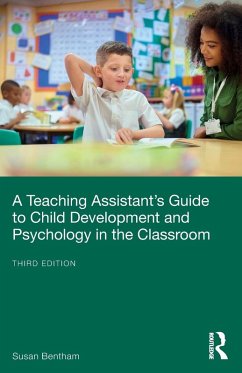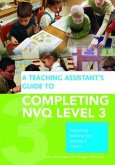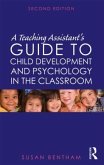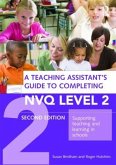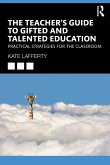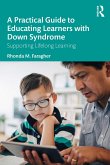Susan Bentham (UK University of Chichester)
A Teaching Assistant's Guide to Child Development and Psychology in the Classroom
Susan Bentham (UK University of Chichester)
A Teaching Assistant's Guide to Child Development and Psychology in the Classroom
- Broschiertes Buch
- Merkliste
- Auf die Merkliste
- Bewerten Bewerten
- Teilen
- Produkt teilen
- Produkterinnerung
- Produkterinnerung
How can you help students most effectively in the classroom? As a Teaching Assistant, you play a vital role in todayâ s schools. This fully updated third edition will help you get to grips with the main issues to do with psychology and its role in the processes of teaching and learning.
Andere Kunden interessierten sich auch für
![A Teaching Assistant's Guide to Completing NVQ Level 3 A Teaching Assistant's Guide to Completing NVQ Level 3]() Susan Bentham (UK University of Chichester)A Teaching Assistant's Guide to Completing NVQ Level 350,99 €
Susan Bentham (UK University of Chichester)A Teaching Assistant's Guide to Completing NVQ Level 350,99 €![A Teaching Assistant's Guide to Child Development and Psychology in the Classroom A Teaching Assistant's Guide to Child Development and Psychology in the Classroom]() Susan Bentham (UK University of Chichester)A Teaching Assistant's Guide to Child Development and Psychology in the Classroom42,99 €
Susan Bentham (UK University of Chichester)A Teaching Assistant's Guide to Child Development and Psychology in the Classroom42,99 €![A Teaching Assistant's Guide to Completing NVQ Level 2 A Teaching Assistant's Guide to Completing NVQ Level 2]() Susan Bentham (U Bognor Regis Community College of Adult EducationA Teaching Assistant's Guide to Completing NVQ Level 260,99 €
Susan Bentham (U Bognor Regis Community College of Adult EducationA Teaching Assistant's Guide to Completing NVQ Level 260,99 €![The Teacher's Guide to Gifted and Talented Education The Teacher's Guide to Gifted and Talented Education]() Kate Lafferty (University of Melbourne)The Teacher's Guide to Gifted and Talented Education31,99 €
Kate Lafferty (University of Melbourne)The Teacher's Guide to Gifted and Talented Education31,99 €![What Works in School Leadership? What Works in School Leadership?]() Linet ArthurWhat Works in School Leadership?37,99 €
Linet ArthurWhat Works in School Leadership?37,99 €![AAC and Aided Language in the Classroom AAC and Aided Language in the Classroom]() Katy LeckenbyAAC and Aided Language in the Classroom60,99 €
Katy LeckenbyAAC and Aided Language in the Classroom60,99 €![A Practical Guide to Educating Learners with Down Syndrome A Practical Guide to Educating Learners with Down Syndrome]() Rhonda M. FaragherA Practical Guide to Educating Learners with Down Syndrome34,99 €
Rhonda M. FaragherA Practical Guide to Educating Learners with Down Syndrome34,99 €-
-
-
How can you help students most effectively in the classroom? As a Teaching Assistant, you play a vital role in todayâ s schools. This fully updated third edition will help you get to grips with the main issues to do with psychology and its role in the processes of teaching and learning.
Produktdetails
- Produktdetails
- Verlag: Taylor & Francis Ltd
- 3 ed
- Seitenzahl: 232
- Erscheinungstermin: 16. Juni 2025
- Englisch
- Abmessung: 216mm x 140mm x 13mm
- Gewicht: 302g
- ISBN-13: 9781032592411
- ISBN-10: 1032592419
- Artikelnr.: 72654579
- Herstellerkennzeichnung
- Libri GmbH
- Europaallee 1
- 36244 Bad Hersfeld
- gpsr@libri.de
- Verlag: Taylor & Francis Ltd
- 3 ed
- Seitenzahl: 232
- Erscheinungstermin: 16. Juni 2025
- Englisch
- Abmessung: 216mm x 140mm x 13mm
- Gewicht: 302g
- ISBN-13: 9781032592411
- ISBN-10: 1032592419
- Artikelnr.: 72654579
- Herstellerkennzeichnung
- Libri GmbH
- Europaallee 1
- 36244 Bad Hersfeld
- gpsr@libri.de
Susan Bentham is Principal Lecturer in Education at the University of Chichester and a chartered psychologist. She has previously published How to be a Brilliant Teaching Assistant (2018, Routledge), A Teaching Assistant's Guide to Completing NVQ Level 3 (2009, Routledge), and A Teaching Assistant's Guide to Managing Behaviour in the Classroom (2005, Routledge).
Introduction
Definitions of reflection and the reflective practitioner
Ways to reflect: the reflective account
Ways to reflect: the professional dialogue
Final comments
1. Basic principles underlying pupil development and learning
Intellectual and cognitive skills
Language and communication skills
Social and emotional skills
Specific skills and abilities
Summary
2. Learning support strategies
Learning strategies as a way to promote effective learning
Specific skills
Summary
3. Creating an optimal learning environment
Barriers to effective learning
In search of an optimal learning environment
Learning preferences
Summary
4. Pupils with Additional Needs
Inclusion
Terminology
Autism spectrum
Dyslexia
Developmental coordination disorder
Attention-deficit hyperactivity disorder
Speech, language, and communication difficulties
Sensory impairment
English as an additional language
Care experienced children
Mental health and wellbeing
Putting it all together
5. Behaviour for learning
Introduction
Language of behaviour
Strategies to promote good behaviour
Summary
6. Establishing positive relationships with pupils and colleagues
Introduction
Basic principles of effective communication with pupils
Techniques of active listening
Pupil voice, agency, and co-production
Working with groups
Staff wellbeing
What does a collaborative relationship look like?
7. Self-esteem, motivation, and independent learners
Self-esteem and self-concept
Factors that affect the development of self-esteem and self-concept
Strategies that will enhance self-esteem
Praise and self-esteem
The relationship between self-esteem and achievement
Motivation
Factors that promote independence: developing autonomy
Teaching choice
Definitions of reflection and the reflective practitioner
Ways to reflect: the reflective account
Ways to reflect: the professional dialogue
Final comments
1. Basic principles underlying pupil development and learning
Intellectual and cognitive skills
Language and communication skills
Social and emotional skills
Specific skills and abilities
Summary
2. Learning support strategies
Learning strategies as a way to promote effective learning
Specific skills
Summary
3. Creating an optimal learning environment
Barriers to effective learning
In search of an optimal learning environment
Learning preferences
Summary
4. Pupils with Additional Needs
Inclusion
Terminology
Autism spectrum
Dyslexia
Developmental coordination disorder
Attention-deficit hyperactivity disorder
Speech, language, and communication difficulties
Sensory impairment
English as an additional language
Care experienced children
Mental health and wellbeing
Putting it all together
5. Behaviour for learning
Introduction
Language of behaviour
Strategies to promote good behaviour
Summary
6. Establishing positive relationships with pupils and colleagues
Introduction
Basic principles of effective communication with pupils
Techniques of active listening
Pupil voice, agency, and co-production
Working with groups
Staff wellbeing
What does a collaborative relationship look like?
7. Self-esteem, motivation, and independent learners
Self-esteem and self-concept
Factors that affect the development of self-esteem and self-concept
Strategies that will enhance self-esteem
Praise and self-esteem
The relationship between self-esteem and achievement
Motivation
Factors that promote independence: developing autonomy
Teaching choice
Introduction
Definitions of reflection and the reflective practitioner
Ways to reflect: the reflective account
Ways to reflect: the professional dialogue
Final comments
1. Basic principles underlying pupil development and learning
Intellectual and cognitive skills
Language and communication skills
Social and emotional skills
Specific skills and abilities
Summary
2. Learning support strategies
Learning strategies as a way to promote effective learning
Specific skills
Summary
3. Creating an optimal learning environment
Barriers to effective learning
In search of an optimal learning environment
Learning preferences
Summary
4. Pupils with Additional Needs
Inclusion
Terminology
Autism spectrum
Dyslexia
Developmental coordination disorder
Attention-deficit hyperactivity disorder
Speech, language, and communication difficulties
Sensory impairment
English as an additional language
Care experienced children
Mental health and wellbeing
Putting it all together
5. Behaviour for learning
Introduction
Language of behaviour
Strategies to promote good behaviour
Summary
6. Establishing positive relationships with pupils and colleagues
Introduction
Basic principles of effective communication with pupils
Techniques of active listening
Pupil voice, agency, and co-production
Working with groups
Staff wellbeing
What does a collaborative relationship look like?
7. Self-esteem, motivation, and independent learners
Self-esteem and self-concept
Factors that affect the development of self-esteem and self-concept
Strategies that will enhance self-esteem
Praise and self-esteem
The relationship between self-esteem and achievement
Motivation
Factors that promote independence: developing autonomy
Teaching choice
Definitions of reflection and the reflective practitioner
Ways to reflect: the reflective account
Ways to reflect: the professional dialogue
Final comments
1. Basic principles underlying pupil development and learning
Intellectual and cognitive skills
Language and communication skills
Social and emotional skills
Specific skills and abilities
Summary
2. Learning support strategies
Learning strategies as a way to promote effective learning
Specific skills
Summary
3. Creating an optimal learning environment
Barriers to effective learning
In search of an optimal learning environment
Learning preferences
Summary
4. Pupils with Additional Needs
Inclusion
Terminology
Autism spectrum
Dyslexia
Developmental coordination disorder
Attention-deficit hyperactivity disorder
Speech, language, and communication difficulties
Sensory impairment
English as an additional language
Care experienced children
Mental health and wellbeing
Putting it all together
5. Behaviour for learning
Introduction
Language of behaviour
Strategies to promote good behaviour
Summary
6. Establishing positive relationships with pupils and colleagues
Introduction
Basic principles of effective communication with pupils
Techniques of active listening
Pupil voice, agency, and co-production
Working with groups
Staff wellbeing
What does a collaborative relationship look like?
7. Self-esteem, motivation, and independent learners
Self-esteem and self-concept
Factors that affect the development of self-esteem and self-concept
Strategies that will enhance self-esteem
Praise and self-esteem
The relationship between self-esteem and achievement
Motivation
Factors that promote independence: developing autonomy
Teaching choice

